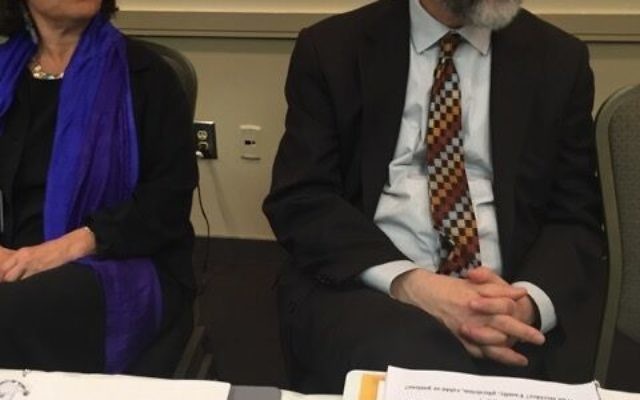When Child Becomes Caregiver: Life’s Marathon Gives Us the Chance for Closure
Above: Photo by Arlene Caplan Appelrouth. Weinstein Hospice geriatric social worker Jenifer Firestone and Congregation Beth Jacob Rabbi Ilan Feldman address questions about adult children caring for aging parents.
By Arlene Caplan Appelrouth
aappelrouth@atljewishtimes.com
Watching parents age can be filled with suffering, fear and demands — for the one who is aging and for the one who, like it or not, is transformed from child to caregiver.
In our death-denying culture, aging, illness and death are perceived as depressing. Because these subjects make people uncomfortable, it’s common for the elderly and their adult children to avoid creating a strategy for the eventuality of death.
Congregation Beth Jacob and Weinstein Hospice in May presented a two-part workshop on kibud av v’eim (honoring your mother and father), “Navigating the Journey From Child to Caregiver,” drawing nearly 30 people to Beth Jacob on two Sunday mornings.
Mira Bergen, a hospice volunteer for 28 years, is the Beth Jacob congregant responsible for bringing the program to the Toco Hills synagogue. The workshop has been presented at other synagogues. Contact Weinstein Hospice at 404-352-4308 for more information.
Geriatric social worker Jenifer Firestone, who works for Weinstein Hospice, made a comprehensive presentation about four major topics May 15: housing options, health care decisions, legal protections and emotional survival strategies for the caregiver.
A week later, Beth Jacob Rabbi Ilan Feldman talked about Jewish law and how to interpret it in regard to end-of-life decisions.
Firestone, who moved to Atlanta five years ago to be available to her parents here, characterized the journey of becoming a caregiver as “hard and sad and painful.”
She referred to the “Silver Tsunami” of society because 44.7 million Americans were over 65 years old in 2013. It’s predicted that by 2040 nearly 28 percent of the U.S. population will be over 65.
Older people need help with cooking, eating, bathing, dressing, getting around and managing medications for many years.
Who takes care of the aging population?
According to AARP, 40 million people who provide 37 billion hours of help are primarily people “on the side” or family members.
Firestone said the average caregiver is a 50-year-old married woman who works full time and provides an average of 19 hours of care to parents each week.
Firestone knows what those caregivers are going through. Her 95-year-old father is deaf and depressed and has a difficult time walking.
Taking care of an older parent is time-consuming.
“It’s a marathon, not a sprint,” Firestone said.
“I’ve learned a lot from watching my parents. They make enormous demands on our time, energy and bank accounts as their aging disrupts our personal and professional lives,” she told the workshop participants, most of whom were already grappling with the responsibilities of caring for their parents.
The challenge, Firestone said, is “getting past the morbid part to be with them in their misery.”
Rabbi Feldman spoke to the group about the opportunity adult children have when they find themselves in a caretaking role.
“The design of life is we are cared for by our parents when we are born, and we care for them at the end of their lives,” he said. “This gives us the opportunity to forgive them, let go and realize the love you have for them. It allows us to get complete.”
Fulfilling the command of kibud av v’eim, Rabbi Feldman said, “is how we honor our parents and also our own lives. When we do this, we are taking our life seriously as we honor the source of all life.”




comments